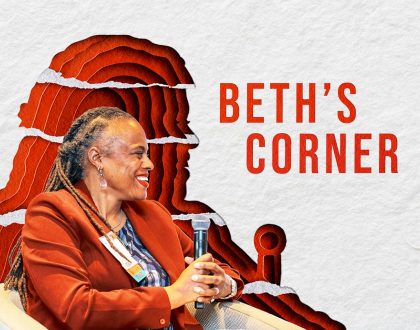Beth’s Corner: Cultivating Moral Courage in DEI Work

This month, YW Boston has been focusing on inspiring moral courage, which means standing up and acting when injustices occur, human rights are violated, or when persons are treated unfairly, regardless of perceived or actual risks.
Earlier in my career, I was approached by a summer intern who claimed sexual harassment by the organization’s CEO. Per the organization’s handbook, serious complaints against the CEO needed to go to the Board Chair. I was new in my role, the primary breadwinner in our household, and we had recently welcomed a new baby into the family. Going to the Board Chair could have jeopardized my job. Yet, I had no choice. She was brave enough to share the situation with me. I had to be brave enough to share it with the Board Chair.
Despite the personal risks involved, I knew I had to act on behalf of the intern who bravely shared her experience of sexual harassment. Courageous individuals throughout history have faced similar challenges, standing up to injustice despite daunting odds; like the Indigenous Peoples who fought against European Colonization, Black people who liberated themselves from slavery, abolitionists who risked their reputations and lives, the thousands of activists of the Civil Rights and Women’s Rights Movements, and the Indigenous activists who continue to occupy their ancestral lands in defiance of the Federal Government. The list goes on.
While the struggles of the past might not look today exactly like they did when they first occurred, they persist and are defended by formidable power structures that desperately want to maintain the status quo. Because of this, it can feel really intimidating to stand up and act. Fortunately, the concept of moral courage isn’t limited to the “big stage.” You have the power as an individual to cultivate moral courage in yourself and others.
Step 1: Recognize Your Role
Ask yourself: “How am I perpetuating injustice?” Two very common behaviors are groupthink and rationalization. We all have a natural human instinct to go along with a group or leader for a sense of safety, status, and belonging. When you don’t feel right about it, you might rationalize the situation, preferring to compromise your personal and professional standards and avoid the risks of displaying moral courage. You say to yourself: “No one else is intervening, so why should I?” This is also known as the bystander effect.
Step 2: Honor Your Emotions
Failure to act in the face of injustice can breed natural feelings of fear, shame, guilt, and anxiety—all uncomfortable emotions that most of us would rather not experience. However, these feelings can be a signal that you are not acting in line with your morals or values. Rather than pushing these difficult thoughts and feelings away, look at them as information, then consider and adjust your behavior accordingly.
Step 3: Commit to Your Courage
When you commit to practicing moral courage, you liberate yourself from the constraints of fear and free up time to focus your energy on figuring out a way forward; you get to decide how you will stand up to injustice, not if. This cognitive reframing helps support effective analysis of a situation, allowing you to view it clearly and avoid the stumbling blocks that might impede moral courage and cause you to “reason” yourself out of the risk of taking action.
As you navigate your journey towards practicing courageous DEI, I encourage you to keep the words of Civil Rights activist Fannie Lou Hamer in mind:
“When I liberate myself, I liberate others. If you don’t speak out ain’t nobody going to speak out for you.”
If you do nothing about injustice, nothing will change. It’s better to do the right thing in the face of fear than give in and let bad things happen.
For concrete strategies for practicing moral courage in your workplace, institution, or community, sign up to receive United Against Racism—our exclusive, self-paced curriculum designed to educate, contextualize, and empower organizations and individuals looking to better understand and address racism in Boston and beyond. I am very proud of this curriculum and hope you find it useful in your quest to be more courageous.
Beth Chandler is President & CEO of YW Boston. Learn more about Beth here.
